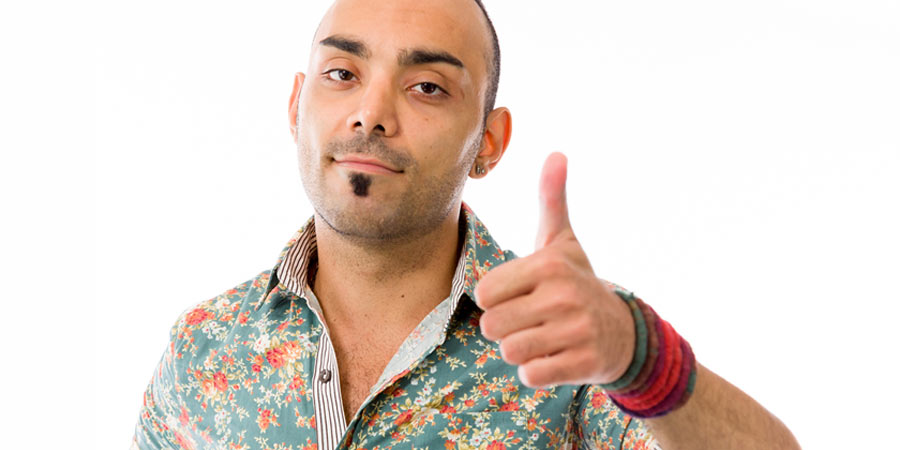A Guide to Coming Out

I grew up as part of a really supportive family. But when I decided to come out, shortly after realising I was bisexual, even I was worried how my family would react. One of my parents is relatively conservative. And at the time, my family didn’t know any queer people, so I wasn’t quite sure how they felt about the rainbow community.
As rewarding as it can be in the long run, coming out can also be scary, tiring and emotionally draining. As members of the LGBTQIA+ community, often our process of declaring our queerness never ends.
Let’s take a look at some of the pros and cons of coming out and talk through some options on how to go about it.
When is the right time to come out?
I entered the dating scene a little later than average, at the age of 27. And only then did it occur to me that I may not be straight! I decided to tell my family I was “maybe bisexual” within a month or so of my own realisation. I thought that the longer I kept this to myself, the harder it might be for me to share later.
We don’t all have the luxury of choosing the time and place of our rainbow debut (sometimes we’re non-consensually outed by friends, family or colleagues). But for those of us who can choose, we can announce our queerness on our own terms.
No matter where you’re at, the most important thing is to think about when you feel ready. The “right” time to come out is usually when we feel safe enough to do so (more on this later), or when we decide that living our best lives becomes more important than the stress of hiding our true identity.
Nobody can tell you when the right time is for you, but hopefully, you can make an informed decision based on these factors.
What are the risks of coming out?
When I was coming out, I’d heard stories of people whose parents kicked them out after their big reveal. Even though I knew my family were generally supportive, I’d be lying if I said I wasn’t a tiny bit worried they wouldn’t take the news well. I was fortunate enough that I was an autonomous adult who would have survived if they had kicked me out. But not everyone has this privilege.
Leaving the closet isn’t always rainbows and hugs. Sadly, there are still large pockets of society that don’t understand or accept LGBTQIA+ people. Some people react poorly when they find out we’re another one of those beautiful queer folks. If these people have power over us things can be even harder.
For example, if our parents aren’t accepting of the rainbow community, and we still depend on them for housing or other support, coming out to them might include a fear of being cut off and not having somewhere to live. Colleagues or employers who aren’t accepting can make our work lives difficult if we mistakenly confide in them. These are some things that, unfortunately, we still need to consider when beginning our journey.
What are the benefits of coming out?
One thing I’ve learned about myself is that keeping secrets makes me anxious. I realised that sharing this “secret” with my family would probably feel better than keeping it to myself. Afterwards, I started getting involved in the queer community in Melbourne, and I’ve met some amazing people since; no regrets!
Joining the queer community can be super rewarding. Pride parades, for example, are a great way for LGBTQIA+ people to feel valued and supported and find a sense of community, but often are only accessible after we’ve come out.
Being out means we can get involved in social groups that accept us for who we are, and who may experience similar and relatable struggles to our own. We can share empathy and strategies to deal with identity specific issues.
This study suggests that coming out can be good for our mental health and reduce our stress levels. And it makes sense; not being able to be ourselves and talk about our sexuality can be stressful and demoralising.
Other benefits include being able to talk to medical professionals about issues specifically applicable to people like us. This could cover anything from STI risks through to our mental health and more.
Being out gives us a level of support we just can’t access while in the closet. And while coming out can be stressful, in the long run, it usually turns out to be a net benefit to our quality of life.
How to come out
If you’re nervous about announcing your queer arrival, you can do some advanced preparation to make things a little easier.
Ensure you have a support network
Depending on where you live and how liberal people are there, you might be able to find support for your coming-out journey from organisations or community groups. In Australia, QLife is a great place to look for LGBTI services in your local area. These can be great places to talk through your plans to come out, get feedback on strategies etc. If you’re religious, there may be queer-positive churches in your area which can help with spiritual guidance around queerness.
Prepare answers to some likely questions
If you’re coming out to close friends or family, it’s possible they won’t fully understand the implications of your big reveal. Having prepared answers to questions like how they can support you, where they can learn more about your gender or sexual orientation, or whether you’re dating anyone, can reduce some stress caused by trying to answer these questions on the fly. Be prepared to answer well-meaning but insulting questions like “have you tried not being gay?” or “maybe you just haven’t found the right woman?”
Leaving the closet
Feeling safe and ready to take the leap? With your support networks in place and your preparation done, you can schedule some time with the people you want to share your exciting news with. You could do this over the phone, via text, over dinner or by wearing a brightly coloured T-shirt that says “I’m gay!” There’s no wrong way to come out, just do whatever’s most comfortable for you! You can do it!
I didn’t seek a support network, because I wasn’t too worried that I’d need it. My approach was to sit my parents down one day and tell them that I’d started dating, and that I had two dates lined up already; one with a man, and one with a woman. They were definitely surprised, and I get the feeling the reality of this information didn’t hit them immediately. Nonetheless, they tried their best to be supportive, even if we didn’t have a long discussion about it.
It’s possible that some people you come out to will not have a big reaction to your news at all. They may just need some time to process things before responding. They might have already suspected you were queer and be unsurprised when you tell them, or they might not really care at all.
After coming out
Congratulations! You’ve successfully come out to your people, whoever they may be. There are several other things worth thinking about after coming out.
Give people time to process
Some people will respond better to your rainbow reveal than others. There’s a whole spectrum; from folks who will be really excited for you or won’t see it as a big deal, all the way to people who Just Don’t Get It. Unfortunately some people still struggle to accept parts of the LGBTQIA+ community and might need time to process what this means.
I found out that after I sent my mum a photo of me and my first boyfriend, she went away and cried. This wasn’t because she had a problem with me being bisexual, but, I think, because she worried how society would treat me.
Parents may need to come to terms that their offspring might have a harder life than they wanted because they’re a member of the queer community, and others may object to the rainbow community on religious or other conservative grounds. Either way, it’s worth giving your people some processing time, and if you have the energy (and it’s totally fair if you don’t!), you can help by offering educational resources for them to review in their own time if they want to.
Reach out to your support network if necessary
Coming out can take a lot out of you. Reaching out to a support network after your big reveal can help and allow you to talk through your feelings with people who are supportive and appreciate what you’re going through. Give yourself the opportunity to get the support you need.
Reward yourself for your courage
And finally, take some time out for yourself, to process your feelings around all of this. It’s a huge step, and it’s worth recognising the emotional work you’ve just put in, and rewarding yourself for it. This could mean taking yourself out for a nice dinner (or going out with friends) or sitting in front of your TV to watch a guilty pleasure.
For many of us, coming out is an endless journey, but this step will go towards making it easier in future. So be proud of yourself! And again, congratulations!
(As for my journey? Well, after the initial surprise my family have been really great, and they really like my current same-sex partner. Coming out has given me an amazing sense of community and some great friends who I never would’ve met otherwise, and I don’t think I’d change a thing!)



Likes & Comments
Comments (2)
Alphamale851
Tallboy420